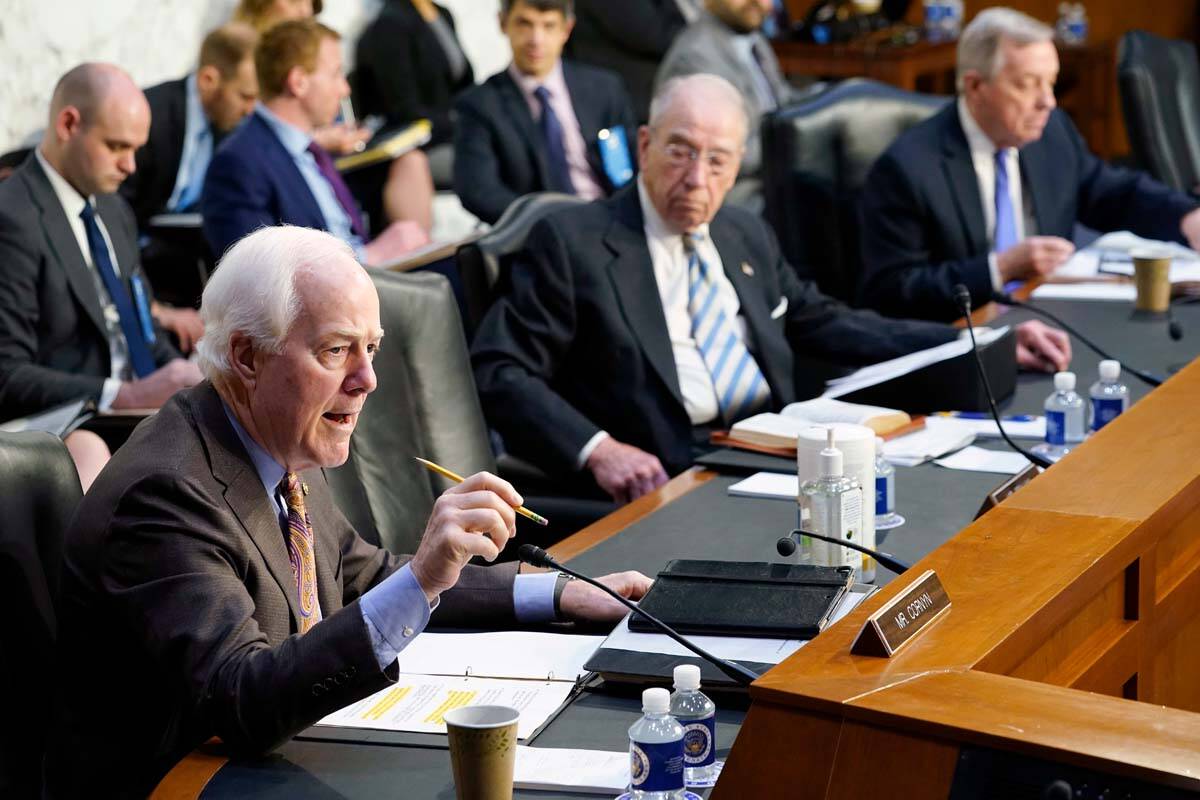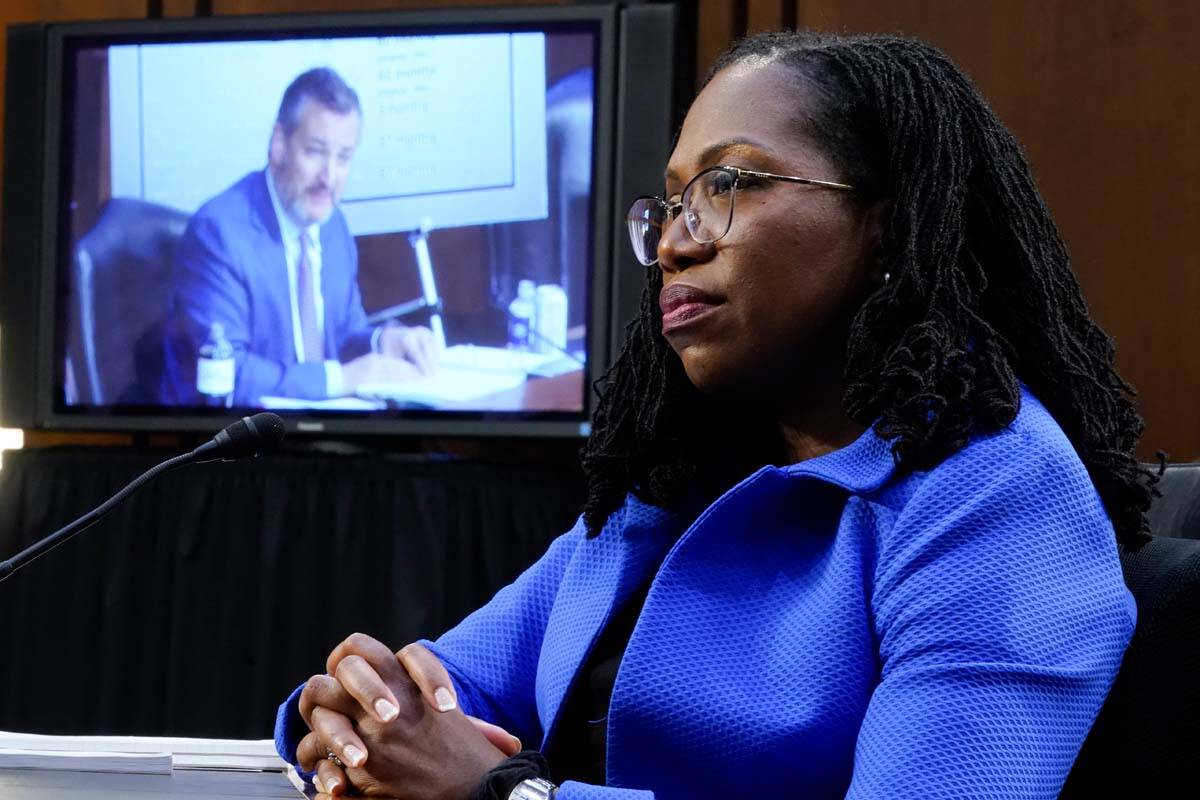Jackson defends sentencing record as contentious hearings continue
WASHINGTON — A hearing for Supreme Court nominee Ketanji Brown Jackson got off to a contentious start Wednesday when Republicans sparred with Democrats over process and ramped up questions about lenient sentencing in child pornography cases.
It escalated from there.
Jackson, 51, the first Black woman nominated to serve on the high court, fielded a barrage of questions from Republicans in combative exchanges over Guantanamo Bay detainees, critical race theory and her views on religion.
“Your nomination turned out to be a testing ground for conspiracy theories and culture war theories … I’m sorry that we have to go through this,” said Sen. Dick Durbin, D-Ill., the chairman of the Senate Judiciary Committee.
Jackson said she would rule without agendas if she is confirmed to the Supreme Court.
Durbin called a Monday session for the committee to vote on whether to advance Jackson’s nomination to the full Senate could be held. Senate confirmation is widely expected, with bipartisan support.
Conservatives won a pledge by Jackson to recuse herself from an admissions case involving Harvard University, where she continues to serve on the Board of Overseers. The Harvard case is one of two before the high court about affirmative action and race-based admissions.
Nonetheless, Republicans hammered her judicial record and implied that she is a liberal, out-of-the-mainstream jurist who is soft on crime.
Dubin suggested that Republican charges and characterizations were driven by ideological interests and political goals, including those held by members on the panel who hold GOP presidential aspirations.
But Durbin’s defense of Jackson prompted Sen. John Cornyn, R-Texas, to lodge a complaint over what he called the chairman’s constant editorializing on GOP questions and inquiries during the hearing.
And Sen. John Kennedy, R-La., jumped in to protest Durbin’s singling out of Sen. Josh Hawley, R-Mo., over his motives in raising the GOP strategy to paint Jackson as overly lenient in sentencing those charged in child pornography cases.
Unfazed, Durbin opened the hearing by debunking a charge made by Cornyn a day earlier.
Cornyn accused Jackson of calling former President George W. Bush and then-Defense Secretary Don Rumsfeld war criminals in a legal motion filed on behalf of a client held at a Navy base in Cuba after Sept. 11, 2001. The motion never specifically named Bush or Rumsfeld, Durbin said, and Jackson volunteered that she would never make such a claim of a sitting president.
Durbin said Republicans were using such characterizations and claims about Jackson to raise doubts about her suitability for the Supreme Court.
“These charges don’t hold up,” Durbin said.
More scrutiny
Despite efforts by Democrats to defend Jackson, Republicans stepped up their scrutiny of her judicial record, particularly on sentences handed down to those convicted on child pornography charges.
Jackson again defended her decision to impose some sentences that were less than the federal sentencing guidelines, but consistent with recommendations of the U.S. Probation and Pretrial Services System and other considerations.
Sen. Lindsey Graham, R-S.C., who stormed out of the hearing Tuesday after a tirade on her role as a public defender of alleged terrorists held in Cuba, implied Wednesday that Jackson was too lenient in child pornography cases.
Graham charged that Jackson’s short prison sentences and supervisory probation were less effective than more prison time, what he said was a greater deterrent.
“Your view of how to deter child porn is not my view,” an animated Graham told Jackson. “Put their ass in jail — not supervise their computer usage.”
Graham’s combustible questioning prompted Durbin to intervene to allow Jackson to speak.
Jackson said that in each case she imposed some prison time.
Democrats have repeatedly shown national statistics on sentencing in similar cases that show 80 percent of those handed down by federal District Court judges in all states fall below federal sentencing guidelines.
But Sen. Ted Cruz, R-Texas, said some of Jackson’s sentences were too low. He launched into a similar colloquy on Jackson, and her record. That again forced Durbin to intervene, asking Cruz if he just wanted to just “make a speech.”
“I appreciate the chairman trying to filibuster,” Cruz shot back, demanding more time because of the chairman’s interruption.
“If you want to testify, you can,” Cruz said, before eventually being cut off by Durbin as the Texas senator’s allotted time expired.
During the heated exchange, Jackson again spoke about the discretion that judges are given to avoid sentencing disparity with punishment ranges that don’t distinguish between those looking at computer files, and those making the illicit content.
“I have taken every case seriously,” Jackson said. “These are very horrible crimes.”
When Hawley asked if she regrets a “slap on the wrist” sentence to an 18-year-old who was faced similar charges three years later, Jackson replied “What I regret is that in a hearing about my qualifications to be a justice on the Supreme Court, we have spent a lot of time focusing on this small subset of my sentences.”
With her husband and family behind her, Jackson remained stoic during the withering hours of questioning.
Jackson was, however, brought to tears when Sen. Cory Booker, D-N.J., chided his GOP colleagues for the tone of their questioning, their mistreatment of a well-qualified jurist and her historic nomination.
Booker praised Jackson for being an inspiration for Black Americans who take pride in her nomination to the highest court in the nation.
“You have earned this spot. You are worthy. You are a great American,” an emotional Booker told Jackson. “You are my harbinger of hope.”
Hearings echo national themes
Before the hearings began Democrats and Republicans stipulated that Jackson was well qualified.
She received the highest rating by the American Bar Association and was endorsed by various groups including the Fraternal Order of Police, and 20 state attorneys general, including Aaron Ford of Nevada. Jackson received bipartisan Senate confirmation to serve on the U.S. Sentencing Commission, as a federal district judge for the District of Columbia, and as an appellate judge on the D.C. Circuit Court of Appeals.
Cruz, Hawley and Graham are considered possible candidates to seek the GOP presidential nomination in 2024.
The hearing provided a sounding board for Republican political themes currently used in campaigns in 2022 midterm elections.
Judicial experts said Jackson answered question with clarity, and avoided those without relevance to her nomination or the role of the Supreme Court justice.
“She persuasively defended her record, especially on the bench,” said Carl Tobias, professor at the University of Richmond School of Law. “Republican members did question her record, but few questions had much traction and a number were counterproductive and looked like attacks.”
Senate Majority Leader Chuck Schumer, D-N.Y., has called for a confirmation vote in April.
“I expect a few GOP members to support Judge Jackson on the floor,” said Tobias, a founding faculty member of the UNLV William S. Boyd School of Law.
Sen. Susan Collins, R-Maine, Sen. Lisa Murkowski, R-Alaska, voted to confirm Jackson for previous judgeships. Sen. Mitt Romney, R-Utah, could also support the nomination, Tobias said.
Contact Gary Martin at gmartin@reviewjournal.com. Follow @garymartindc on Twitter.






























